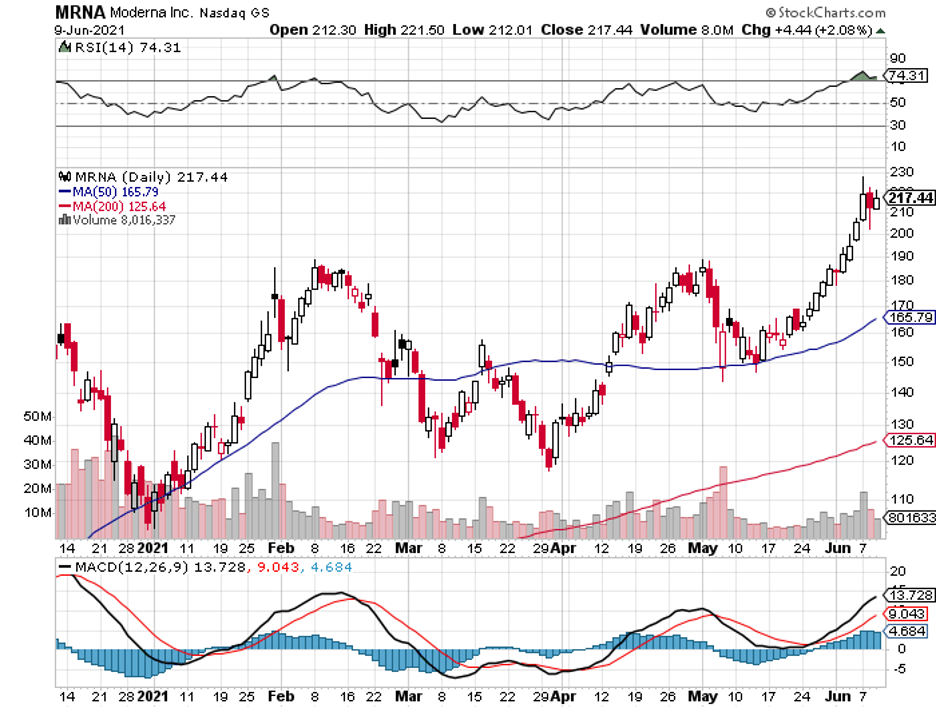In the Right Place at the Right Time
Before the COVID-19 pandemic, only a handful of people had actually heard of messenger RNA (mRNA).
Now, this technology has become a household term thanks to the success of the COVID-19 vaccine programs of Pfizer (PFE), BioNTech (BNTX), and Moderna (MRNA).
Aside from these three names, other players in the mRNA arena include Novavax (NVAX) and an under-the-radar stock called CureVac (CVAC), which has been collaborating with Bayer (BAYRY).
Even Sanofi joined the list recently with its acquisition of mRNA-focused biotechnology company Tidal Therapeutics.
Amid the growing number of mRNA-focused companies, however, the world has come to associate the technology most with Moderna.
This is apparent in the increasing demand for Moderna’s COVID-19 vaccine, which has been pushing the biotech company to quickly expand its manufacturing capacity.
One of the steps it took to meet the supply expectations is to partner with Thermo Fisher (TMO), specifically for fill-finish, labeling, and packaging.
For orders outside the United States, Moderna established a partnership with South Korea’s renowned Samsung Biologics (KRX: 207940) to keep up with the demand.
While TMO and Samsung Biologics are the two major forces helping Moderna in its manufacturing concerns, other companies are also pitching in, including Catalent (CTLT), Sanofi, and Baxter BioPharma Solutions (BAX).
With the assistance of these companies, along with the major expansion of its own manufacturing site, Moderna anticipates that it can supply at least 3 billion doses of its COVID-19 vaccine annually by 2022.
This is promising news, particularly in light of another massive market that Moderna can conquer next: India.
While the United States has managed to turn the corner in the COVID-19 battle, India has been struggling to fight back against the virus. To this day, the country continues to grapple with the increasing number of COVID-19 cases.
Low and sluggish vaccination rates are considered the major contributing factor to this problem, with a measly 3.3% of India’s citizens getting fully vaccinated so far.
With a population of approximately 1.39 billion, this offers a massive opportunity for vaccine developers.
Thus far, only 228 million doses of the COVID-19 vaccines have been shipped to India. That leaves about 1.16 billion people in this huge country to receive a vaccine.
Since India is a developing nation, vaccine makers are expected to charge the low end of their range.
For Moderna, that would be roughly $25 per dose, while Pfizer would probably charge $19.50 per dose.
However, these prices could still go lower depending on the contract negotiated by the Indian government.
Even at the low end of the price point though, the Indian market represents approximately $28 billion in revenue for COVID-19 vaccine developers.
Taking advantage of this momentum, Moderna has been working on booster candidates for its COVID-19 vaccine. In fact, one candidate may be ready by fall.
Of course, competitors are looking into the new variants as well. Aside from Pfizer, smaller companies like Inovio Pharmaceuticals (INO) have started with clinical trials this year.
Moderna is also investing heavily in artificial intelligence (AI) in an effort to become a step ahead of future diseases.
Through AI and machine learning, Moderna aims to predict strains that evade protection provided by their roster of vaccines.
Based on the data, the company will be able to develop next-generation vaccines and boosters before the situation becomes as critical as what happened in 2020.
These efforts are essential for Moderna to sustain its position as the leader in mRNA technology.
Despite its earlier issues with production, Moderna is still set to generate roughly $19.2 billion in revenue for its COVID-19 vaccine thanks to advance purchase agreements.
The potential availability of a booster this year would definitely get the ball rolling in terms of handling newer variants.
The biotechnology industry is favored among investors on the lookout for companies with incredibly strong growth potential.
While it’s a risky environment filled with businesses flaming out practically year after year, winners in this field can come out with extremely impressive results.
In recent months, Moderna has become one of the most successful examples that demonstrated the potential of a biotech when it finds itself with cutting-edge technology at an ideal time.


